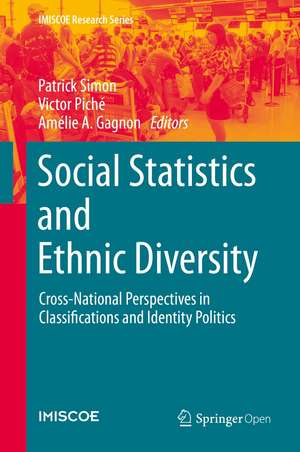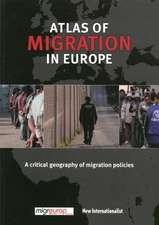Social Statistics and Ethnic Diversity: Cross-National Perspectives in Classifications and Identity Politics: IMISCOE Research Series
Editat de Patrick Simon, Victor Piché, Amélie A. Gagnonen Limba Engleză Hardback – 27 aug 2015
The book first offers comparative accounts of ethnic statistics. It compares and empirically tests two perspectives for understanding national ethnic enumeration practices in a global context based on national census questionnaires and population registration forms for over 200 countries between 1990 to 2006.
Next, the book explores enumeration and identity politics with chapters that cover the debate on ethnic andracial statistics in France, ethnic and linguistic categories in Québec, Brazilian ethnoracial classification and affirmative action policies and the Hispanic/Latino identity and the United States census.
The third, and final, part of the book examines measurement issues and competing claims. It explores such issues as the complexity of measuring diversity using Malaysia as an example, social inequalities and indigenous populations in Mexico and the demographic explosion of aboriginal populations in Canada from 1986 to 2006.
Overall, the book sheds light on four main questions: should ethnic groups be counted, how should they be counted, who is and who is not counted and what are the political and economic incentives for counting. It will be of interest to all students of race, ethnicity, identity, and immigration. In addition, researchers as well as policymakers will find useful discussions and insights for a better understanding of the complexity of categorization and related
political and policy challenges.
| Toate formatele și edițiile | Preț | Express |
|---|---|---|
| Paperback (1) | 418.83 lei 6-8 săpt. | |
| Springer International Publishing – 22 oct 2016 | 418.83 lei 6-8 săpt. | |
| Hardback (1) | 426.18 lei 6-8 săpt. | |
| Springer International Publishing – 27 aug 2015 | 426.18 lei 6-8 săpt. |
Din seria IMISCOE Research Series
-
 Preț: 228.70 lei
Preț: 228.70 lei -
 Preț: 279.98 lei
Preț: 279.98 lei -
 Preț: 422.90 lei
Preț: 422.90 lei -
 Preț: 279.62 lei
Preț: 279.62 lei -
 Preț: 451.76 lei
Preț: 451.76 lei -
 Preț: 179.42 lei
Preț: 179.42 lei -
 Preț: 424.81 lei
Preț: 424.81 lei -
 Preț: 438.26 lei
Preț: 438.26 lei -
 Preț: 280.27 lei
Preț: 280.27 lei -
 Preț: 132.95 lei
Preț: 132.95 lei -
 Preț: 281.15 lei
Preț: 281.15 lei -
 Preț: 266.19 lei
Preț: 266.19 lei -
 Preț: 359.43 lei
Preț: 359.43 lei -
 Preț: 231.66 lei
Preț: 231.66 lei -
 Preț: 436.35 lei
Preț: 436.35 lei -
 Preț: 434.44 lei
Preț: 434.44 lei - 15%
 Preț: 700.75 lei
Preț: 700.75 lei -
 Preț: 424.43 lei
Preț: 424.43 lei -
 Preț: 425.20 lei
Preț: 425.20 lei -
 Preț: 429.83 lei
Preț: 429.83 lei -
 Preț: 425.58 lei
Preț: 425.58 lei -
 Preț: 429.61 lei
Preț: 429.61 lei -
 Preț: 424.43 lei
Preț: 424.43 lei -
 Preț: 426.18 lei
Preț: 426.18 lei -
 Preț: 420.79 lei
Preț: 420.79 lei -
 Preț: 426.94 lei
Preț: 426.94 lei -
 Preț: 429.61 lei
Preț: 429.61 lei -
 Preț: 425.42 lei
Preț: 425.42 lei - 15%
 Preț: 636.45 lei
Preț: 636.45 lei -
 Preț: 424.99 lei
Preț: 424.99 lei -
 Preț: 430.21 lei
Preț: 430.21 lei -
 Preț: 423.84 lei
Preț: 423.84 lei -
 Preț: 427.71 lei
Preț: 427.71 lei -
 Preț: 427.71 lei
Preț: 427.71 lei -
 Preț: 433.85 lei
Preț: 433.85 lei -
 Preț: 430.79 lei
Preț: 430.79 lei -
 Preț: 424.43 lei
Preț: 424.43 lei -
 Preț: 426.56 lei
Preț: 426.56 lei - 15%
 Preț: 583.45 lei
Preț: 583.45 lei -
 Preț: 427.71 lei
Preț: 427.71 lei - 15%
 Preț: 528.13 lei
Preț: 528.13 lei
Preț: 426.18 lei
Nou
Puncte Express: 639
Preț estimativ în valută:
81.58€ • 88.64$ • 68.57£
81.58€ • 88.64$ • 68.57£
Carte tipărită la comandă
Livrare economică 22 aprilie-06 mai
Preluare comenzi: 021 569.72.76
Specificații
ISBN-13: 9783319200941
ISBN-10: 3319200941
Pagini: 244
Ilustrații: VI, 244 p. 14 illus., 2 illus. in color.
Dimensiuni: 155 x 235 x 22 mm
Greutate: 0.53 kg
Ediția:1st ed. 2015
Editura: Springer International Publishing
Colecția Springer
Seria IMISCOE Research Series
Locul publicării:Cham, Switzerland
ISBN-10: 3319200941
Pagini: 244
Ilustrații: VI, 244 p. 14 illus., 2 illus. in color.
Dimensiuni: 155 x 235 x 22 mm
Greutate: 0.53 kg
Ediția:1st ed. 2015
Editura: Springer International Publishing
Colecția Springer
Seria IMISCOE Research Series
Locul publicării:Cham, Switzerland
Public țintă
ResearchCuprins
INTRODUCTION: Chapter 1 The Making of Racial and Ethnic Categories: Official Statistics Reconsidered: Patrick Simon, Victor Piché, and Amélie A. Gagnon.- PART I COMPARATIVE ACCOUNTS OF ETHNIC STATISTICS: Chapter 2. Ethnic Classification in Global Perspective: A Cross-national Survey of the 2000 Census Round: Ann Morning.- Chapter 3. “Inside out”: The Politics of Ethnically Enumerating The Nation: Tahu Kukutai and Victor Thompson.- PART II. ENUMERATION AND IDENTITY POLITICS: Chapter 4. The Choice of Ignorance: The Debate on Ethnic and Racial Statistics in France: Patrick Simon.- Chapter 5. Ethnic and Linguistic Categories in Québec: Counting to Survive: Victor Piché.- Chapter 6. Brazilian Ethnoracial Classification and Affirmative Action Policies: Where Are We and Where Do We Go?:José Luis Petruccelli.- Chapter 7. The Ethnic Question: Census Politics in Great Britain: Debra Thompson.- PART III. MEASUREMENT ISSUES AND COMPETING CLAIMS: Chapter 8. Counting Ethnicity in Malaysia: the Complexity of Measuring Diversity: Shyamala Nagaraj, Tey Nai-Peng, Ng Chiu-Wan, Lee Kiong-Hock, Jean Pala.- Chapter 9. The Growth of Ethnic Minorities in Uruguay: Ethnic Renewal or Measurement Problems?: Wanda Cabella and Rafael Porzecanski.- Chapter 10. The Objective Approaches of Ethnic Origins in Belgium: Methodological Alternatives and Statistical Implications: Nicolas Perrin, Luc Dal and Michel Poulain.- Chapter 11. Social Inequalities and Indigenous Populations in Mexico: A Plural Approach: Olivier Barbary.- Chapter 12. Fuzzy Definitions and Demographic Explosion of Aboriginal Populations in Canada from 1986 to 2006: Éric Guimond, Norbert Robitaille and Sacha Senécal.
Recenzii
“This 12-chapter volume addresses some very topical issues in the measurement of ethnicity. … With the political debates on ethnicity and immigration increasing in volume in the face of new waves of refugees in Europe, political campaigns in the USA, and rising awareness of ethnic identity, this book is very topical and is an interesting addition to any library.” (Margot Almond, Canadian Studies in Population, Vol. 44 (1-2), 2017)
Textul de pe ultima copertă
This open access book examines the question of collecting and disseminating data on ethnicity and race in order to describe characteristics of ethnic and racial groups, identify factors of social and economic integration and implement policies to redress discrimination. It offers a global perspective on the issue by looking at race and ethnicity in a wide variety of historical, country-specific contexts, including Asia, Latin America, Europe, Oceania, and North America. In addition, the book also includes analysis on the indigenous populations of the Americas.
The book first offers comparative accounts of ethnic statistics. It compares and empirically tests two perspectives for understanding national ethnic enumeration practices in a global context based on national census questionnaires and population registration forms for over 200 countries between 1990 to 2006.
Next, the book explores enumeration and identity politics with chapters that cover the debate on ethnic and racial statistics in France, ethnic and linguistic categories in Québec, Brazilian ethnoracial classification and affirmative action policies, and the Hispanic/Latino identity and the United States census.
The third, and final, part of the book examines measurement issues and competing claims. It explores such issues as the complexity of measuring diversity using Malaysia as an example, social inequalities and indigenous populations in Mexico, and the demographic explosion of aboriginal populations in Canada from 1986 to 2006.
Overall, the book sheds light on four main questions: should ethnic groups be counted, how should they be counted, who is and who is not counted, and what are the political and economic incentives for counting. It will be of interest to all students of race, ethnicity, identity, and immigration. In addition, researchers as well as policymakers will find useful discussions and insights for a better understanding of the complexity of categorization and related
political --and policy--challenges. This illuminating and ambitious volume breaks new ground through a global and comprehensive exploration of these questions.
Miri Song, University of Kent
This impressive collection instructs us that massive population movements require many nations to govern their increasingly diverse racial and ethnic populations, confronting unprecedented social tensions and struggling to guarantee new forms of social justice.
Kenneth Prewitt, Columbia University
This book combines an overview of patterns of classification across the world. It is a fascinating look at how the statistics on ethnicity are created, shaped and used in different national contexts. It should be required reading for those who study race and ethnicity, as well as anyone who uses ethnic statistics.”
Mary C. Waters, Harvard University
Next, the book explores enumeration and identity politics with chapters that cover the debate on ethnic and racial statistics in France, ethnic and linguistic categories in Québec, Brazilian ethnoracial classification and affirmative action policies, and the Hispanic/Latino identity and the United States census.
The third, and final, part of the book examines measurement issues and competing claims. It explores such issues as the complexity of measuring diversity using Malaysia as an example, social inequalities and indigenous populations in Mexico, and the demographic explosion of aboriginal populations in Canada from 1986 to 2006.
Overall, the book sheds light on four main questions: should ethnic groups be counted, how should they be counted, who is and who is not counted, and what are the political and economic incentives for counting. It will be of interest to all students of race, ethnicity, identity, and immigration. In addition, researchers as well as policymakers will find useful discussions and insights for a better understanding of the complexity of categorization and related
political --and policy--challenges. This illuminating and ambitious volume breaks new ground through a global and comprehensive exploration of these questions.
Miri Song, University of Kent
This impressive collection instructs us that massive population movements require many nations to govern their increasingly diverse racial and ethnic populations, confronting unprecedented social tensions and struggling to guarantee new forms of social justice.
Kenneth Prewitt, Columbia University
This book combines an overview of patterns of classification across the world. It is a fascinating look at how the statistics on ethnicity are created, shaped and used in different national contexts. It should be required reading for those who study race and ethnicity, as well as anyone who uses ethnic statistics.”
Mary C. Waters, Harvard University
Caracteristici
This open access book examines racial and ethnic diversity in country-specific contexts from around the world Includes analysis on the indigenous groups of the Americas Provides insights into the complexity of categorization and related political and policy challenges












